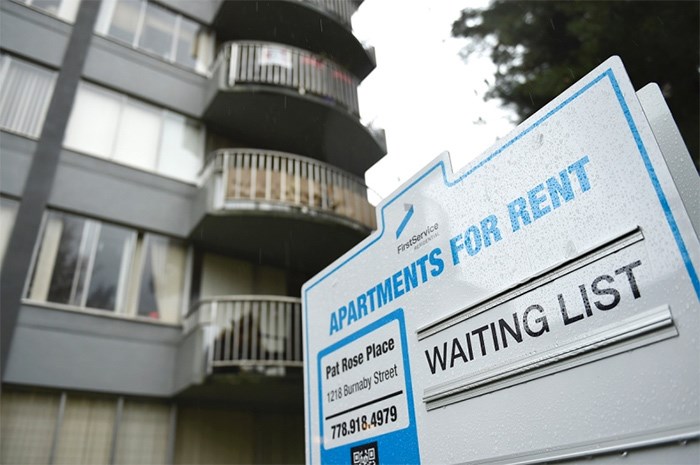The City of Vancouver plans to pilot a new notification system that will inform renters of their tenancy rights by mail when the city receives a permit application to develop select recently sold rental buildings.
It’s among a series of measures designed to improve renters’ circumstances, which are outlined in a press release issued by the city Feb. 27.
 The NDP government’s budget update did not mention the party’s election promise of a $400-a-year renters’ rebate. Photo Dan Toulgoet
The NDP government’s budget update did not mention the party’s election promise of a $400-a-year renters’ rebate. Photo Dan Toulgoet
Renters represent more than half — 53 per cent — of Vancouver’s population and have been increasingly vocal about their plight in a city whose tight vacancy rate has averaged 0.9 per cent over the last three years.
Aside from introducing the notification system, city staff are also planning to update the Tenant Relocation and Protection Policy.
They are consulting with interest groups and plan to present council with an updated policy in June 2019.
Options under consideration include:
- Strengthening the first-right-of-refusal provision by providing increased affordability for low income and vulnerable renters
- Adding a temporary relocation option for renovations
- Increasing communication between landlords and tenants and increasing city staff oversight of this outreach
- Developing options for social housing providers that focus on rehousing, rather than compensation.
In April, meanwhile, staff will report to council on ways in which a Renters Office could be developed. The city has already hired its first staff member — a renter advocacy and support services officer — for the office and created a renters enquiry line.
Once it’s set up, the Renters Office’s aims to improve city services for renters, to collaborate with and support external community-based, renter-serving organizations, and to work with rental advocates to support renters affected by renovation and redevelopment.
The city is also working with the provincial government’s Rental Tenancy Board to improve renter protection and to “ensure greater clarity is provided to city staff, tenants, and the public regarding whether planned work on rental properties justifies eviction of tenants.”
Measures to deal with the fact that much of the existing rental stock, which is often more affordable, is aging and in need of upgrades, are also in the works.
Since 2010, more than 7,000 new rental units have been approved, built or are under construction, but far fewer rental units were built between 1980 and 2009.
To encourage reinvestment of aging rental stock, city staff are looking at:
- Opportunities to encourage critical upgrades, including financial incentives or grants, development easements, and regulatory options and aligning these objectives with work underway to develop a strategy for energy and seismic retrofits in existing buildings
- Developing a pilot program to support critical energy retrofits in existing buildings, including rental, with conditions including no permanent displacement.
The city’s Rental 100 program is also under review.
The program applies to development projects where 100 per cent of the residential rental housing units are secured for 60 years or the life of the building, whichever is greater.
Affordability is achieved primarily through tenure since renting is less expensive than owning, but the program is also designed to give higher-earning residents more options to choose from, thereby lowering the demand for lower-priced rental units.
Incentives available to developers through the program include the potential for a development cost levy (DCL) waiver if rents meet or fall below city guidelines.
To be eligible for the DCL waiver in 2019, proposed rents must meet or fall below these guidelines for the “east area”: $1,607 for a studio, $1,869 for a one-bedroom, $2,457 for a two-bedroom and $3,235 for a three-bedroom. In the “west area,” proposed rents must meet or fall below: $1,768 for a studio, $2,056 for a one-bedroom, $2,703 for a two-bedroom and $3,559 for a three-bedroom.
“Staff will be reviewing this program to determine how we can deepen affordability. A report to Council on the findings of the review and new policy recommendations for program improvement will be drafted by the end of the year,” the city’s press release states.



